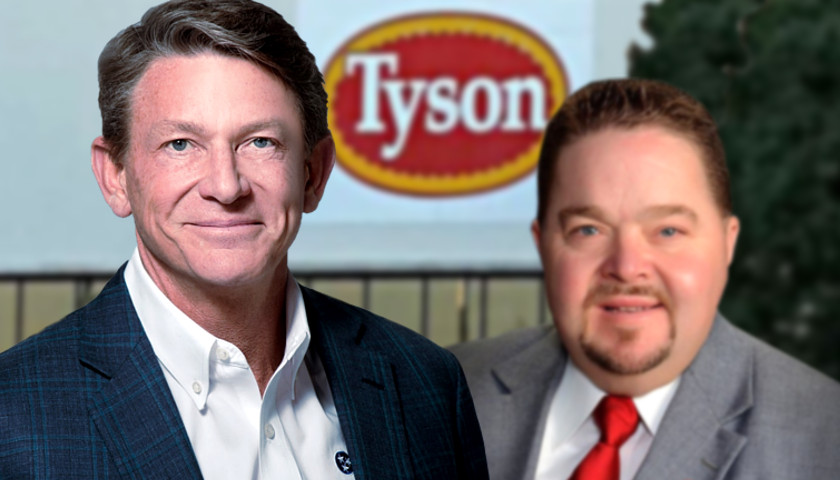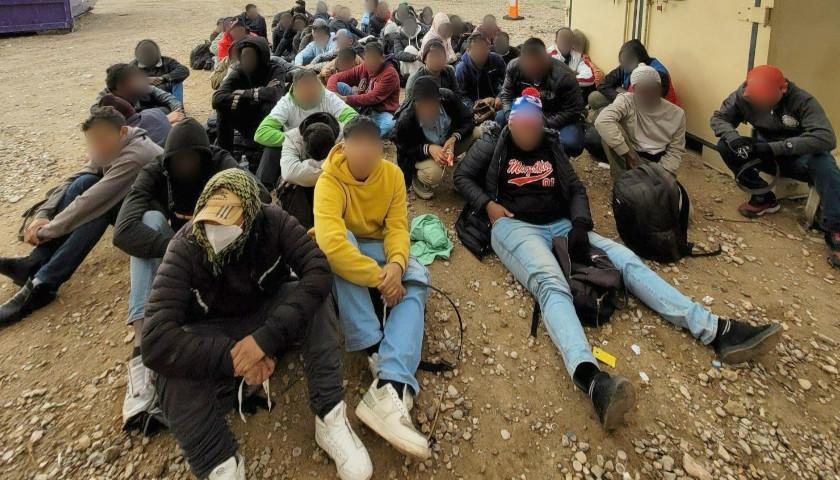Tysons Foods recently announced the building of a chicken processing plant in Humboldt, bringing with it, 1,500 jobs to Gibson County’s largest city. While GOP gubernatorial candidate Randy Boyd was Commissioner of the Department of Economic and Community Development (ECD), business development money began flowing to Gibson County, an investment that has paid off for Boyd with it’s mayor supporting his run for governor.
Tom Witherspoon, mayor of Gibson County was included on Boyd’s July list of county mayor endorsements.
Locating a food processing plant in Gibson County may also continue a trend of transforming small rural towns by becoming a magnet for federal refugee resettlement contractors looking to place low-skill workers who don’t have to speak English.
Tysons Foods has a demonstrated commitment to employing refugees; its Human Resources Manager, Gary Denton served on the board of the Nashville-based Center for Refugees and Immigrants of Tennessee.
Representing the State of Tennessee Economic & Community Development, Lamar Alexander’s son, Will, while serving as Chief of Staff for Haslam’s ECD, served as Treasurer for the resettlement contractor, the Nashville International Center for Empowerment.
The federal resettlement program allows refugee contractors to place refugees within 100 miles of the resettlement contractor’s office and that, “[re]gardless of their initial placement location, however, refugees in the United States are free to relocate. The movement from the placement location to another area is known as secondary migration.”
Humboldt’s population in the last census was under 8,500 and within the 100 mile radius where federal contractors are already resettling refugees including Memphis, Jackson, Madison, Arlington, Cordova and Bartlett.
At a recent conference at the University of Iowa, Rick Rustad, a workplace chaplain at the Tyson plant in Waterloo, about 100 miles away, recalled serving as the plant’s ‘mobile recruit’ for Burmese refugees. He drove a passenger bus to meet with Burmese who had settled in different parts of Illinois, where he offered jobs and brought 30 back to Iowa at a time.
They lived in the Days Inn for a week while Tyson employees helped them find housing, get identification cards and open bank accounts. By the weekend, they’d move into their apartments and report to work Monday.
Like other “big meat” companies, Tysons turned to hiring refugees as a way to avoid hiring illegal alien labor. In 2001, six Tysons employees were indicted for allegedly smuggling illegal Mexican workers across the border and setting them up to work in the meat plants. The Tysons Shelbyville plant went so far as to move unemployed Somali refugee workers from Kansas to Tennessee. At the time, Regina Surber who worked for the Tennessee state government as the State Refugee Coordinator, told the Shelbyville Gazette reporter in 2007, to expect secondary migration to the town as a result of Tysons’ shift in hiring practices:
What happens most often in new resettlement communities is that the first to move there are newly arriving refugees, who, after becoming familiar with the area, encourage their relatives and friends to join them, she said.
Surber said that Tennessee had 172 arrivals from Somalia last year and since 1996, they have resettled 1,878 refugees in the state ‘but many others have moved here from other states over the years.’
U.S. State Department resettlement data available only from 2002 forward, shows initial resettlement of 3,077 Somali refugees to Tennessee, but does not account for secondary migration.
In 2009, the Wall Street Journal reported that the recession was creating greater competition for jobs between native-born locals and refugee workers at the Shelbyville Tysons plant. “Well before the [Shelbyville employment] agency opened that morning, officials from churches and refugee resettlement agencies had transported several vanloads of Asian and African applicants from Nashville.”
J.B.Swift, another of the “big meat” companies has entered into a pilot program with refugee contractor Lutheran Immigration and Refugee Services to provide refugee workers for its plants in several states. It is not known yet whether Tysons will enter into a similar pilot program or would even need to given its established relationship with Tennessee refugee resettlement contractors.
The Partnership for a New American Economy (renamed to New American Economy), is making a focused push for imported low-skill labor with its report, A Crucial Piece of the Puzzle: Demographic Change and Why Immigrants are Needed to Fill America’s Less-Skilled Labor Gap. Key findings of the report include:
- America has a declining number of young people willing and able to work less-skilled jobs. Between 1990 and 2010 the number of less-skilled, young, U.S.-born Americans (aged 25-44) declined by almost 12.3 million.
- The decline in the less-skilled, young population has been particularly pronounced among women. Almost two thirds of the decline in the number of young, less-skilled, U.S.-born individuals can be explained by a decrease in the number of less-skilled women in America.
- The demand for less-skilled workers is strong and growing. According to the U.S. Census, between 1990 and 2010, the number of jobs for less-skilled workers in the U.S. economy remained constant at 45.7 million. And in the coming years, less-skilled employment is expected to grow: The Bureau of Labor Statistics estimates that 63 percent of the new jobs created between 2008 and 2018 will require a high school degree or less.
- Second generation immigrants have helped offset some of these labor gaps. Between 1995 and 2010, while the number of less-skilled, young, American-born individuals overall declined, the number of second-generation immigrants in that category grew by more than 680,000.
- We do not admit a sufficient number of immigrants to offset the looming workforce deficit of less-skilled workers. Between 1990 and 2010, when the number of young, U.S.-born, less-skilled individuals declined by almost 12.3 million, only 3.9 million young immigrants arrived in the country to replace them.
“Never-Trumper” GOP gubernatorial candidate Randy Boyd, is a named member of the Partnership for a New American Economy (PNAE).
President Trump won Gibson County by over 70% of the vote.






There is no labor shortage in America, only an unwilingness to pay high enough wages to attract legal citizen workers. These sickos will transform America into the sh@t-hole countries from whence their slaves have come. We citizens are and will be stuck with the bill and the mess. Our culture will be destroyed so that these men can live fat lives, far away from their works. It is the white importation of black slaves all over again.
[…] includes the newly planned Tyson Foods plant in Humboldt. The Tennessee Star has previously reported on the employment of refugees in Tyson Foods meat processing facilities. A supplemental […]
[…] decision by Tyson Foods to open a meat-packing plant in Humboldt, Tennessee, welcomed recently by Gibson County Mayor Tom Witherspoon, came only after the facility was rejected by citizens in Tonganoxie, Kansas. The “big […]
So Humboldt is now a dumping ground for the refugees??? We thought Tyson was going to be good for our city, not bring in people that can not even speak our language! Give our city jobs, my foot! Thanks but no thanks!
That is exactly what it will become. After the initial wave more will arrive until Humboldt resembles other small Tennessee towns like Shelbyville. I invite you to examine all you can find about the changes to Shelbyville – none of them good.
This is simply an attempt by the government and its corporate paymasters to overthrow the people by importing a new, more subservient one.
People will work jobs at a chicken plant. They won’t work it for what “refugees” who are nothing more than indentured servants are being paid.
Boyd and his sellout America caucus has zero chance.
Brian – You hit the nail directly on the head. These folks care nothing about America and American citizens. It is all about power and money. Yet another reason to toss Boyd to the curb.